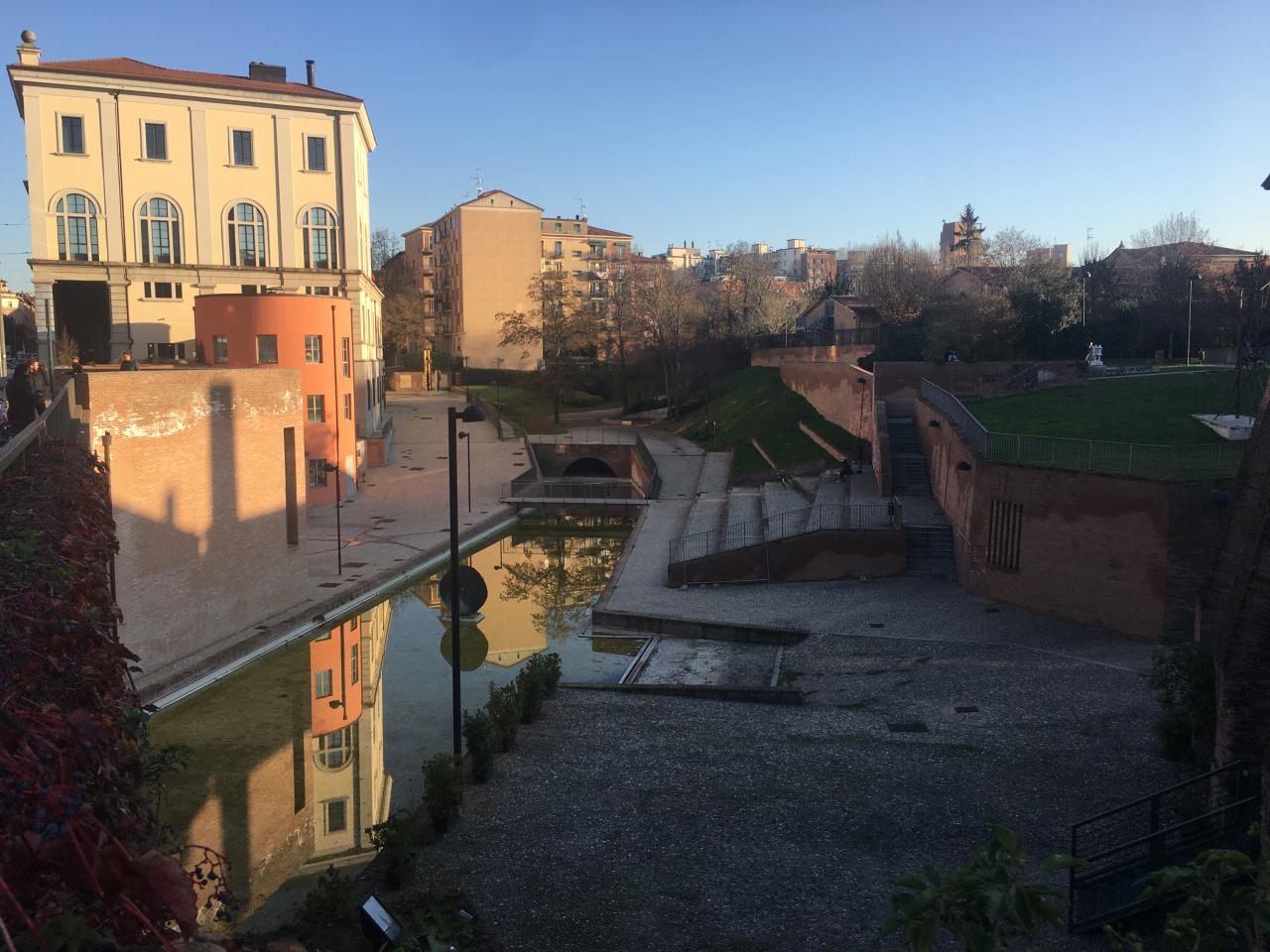
Culture can be an exceptional lever for economic and social development of an urban area from a sustainability point of view. Urban Regeneration Mix’s TNM in Bologna, entitled “Culture as a perspective of regeneration”, aimed to explore and discover the effectiveness of this lever. The meeting wanted to show how culture can be the key element for urban regeneration; for this reason, it took place inside one of Bologna’s factual representations of this strategy: the site of DAMSLab, the laboratory of the Department of Arts, Music and Entertainment of the University of Bologna. Let's see what is happening in Bologna as part of the Urban Regeneration Mix project.
The physical context
DAMSLab is a physical space based in Pasolini square, inside the Manifattura delle Arti (literally, manufacturing of Arts) district, an area of about 100 thousand square meters in the hearth of the historic center of Bologna.
The district originally hosted the port area of the city, from the Renaissance until the nineteenth century; together with its proto-industrial hinterland (Canale di Reno, Navile, Moline, Aposa), it was the mercantile and manufacturing epicenter of the Bolognese economy at least up to the whole 17th century. The current area was designed for the first time in 1883 by the architects Priori and Buriani, and after the demolitions of the town plans of 1889 and 1937 and the bombings of the Second World War, it was renovated from 1996 to 2003 with joint commitment between the Municipality and the University of Bologna, designed by architect Aldo Rossi.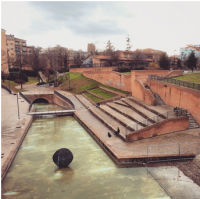
Among other receptive places, the area features many key-role sites of interest for the community, such as the home of the Film Library of Bologna (inside Manifattura Tabacchi, the original Tobacco Factory), the University’s Department of Philosophy and Communications (located in the old paper mill Mulino Tamburi), the Modern Art Gallery Mambo in the former City Bread Oven, the exhibition structure of Salara, the ramparts of Porta Lame, the Music and Performance Laboratories of the University, the Cavaticcio Park and the DAMSLab (located in the former Slaughterhouse).
DAMSLab includes many facilities:
- A 218-seat Auditorium, sober and elegant in its wooden finishes and for the comfortable armchairs, equipped with a Steinway grand piano and a large screen, it is suitable for conferences, the performance of live music and to film screenings.
- The Theater, a space with 82 seats equipped to host theatrical and performative activities (workshops, laboratories, seminars and work demonstrations). The versatility of the space, equipped with a telescopic grandstand and a movable trellis, combined with the variety of equipment, make it a suitable place for experimentation;
- The Cinema Space, a multifunctional environment designed for film, television and multimedia production. Composed of a multipurpose room (equipped with equipment for setting up a stage and a classroom) and rooms for digital audio / video post-production, laboratory and research activities can be carried out.
- The Seminar Room, a space with 54 seats, equipped to host lectures, workshops, meetings and presentations. The size of the room also makes it suitable for more informal and convivial moments.
- The Hall, a large welcoming place, abundantly illuminated by natural light, designed by Aldo Rossi to harmonize the complex with the surrounding area. The large windows overlooking the garden and the architectural lines make it a suggestive space, optimal for the preparation of exhibitions and installations and as a meeting place for informal moments.
- Also, the entrance square of the DAMSLab, also suitable for limited events, such as live performances, artistic exhibitions and workshops.
The social context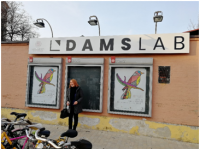
The Manifattura delle Arti area is inside an area of around 70000 residents, where the pressure of the housing market is strong: on one hand, the elderly is finding it more difficult to make ends meet; on the other hand, the rent is too expensive for young people, which is a target that the City wants to engage on a long-term perspective. There is clearly a need to integrate more these groups, in order to maintain the city centre atmosphere and equilibrium, preserving it from the growth of tourist industry, which the City is also stimulating.
DAMSLab is a laboratory aimed at promoting culture at an urban level. Designed and managed by the Department of Arts of the University of Bologna, DAMSLab’s goal is to enhance projects and foster synergies that find in cultural and artistic production and participation the key factor for territorial growth, and a focal point for contemporary and future citizenship. It is open to the territory and brings different areas of knowledge into dialogue. DAMSLab activates and facilitates synergies and collaborations with other Departments and with the city, its cultural institutions, foundations, businesses, museums and associations, favouring social outcomes in terms of awareness-raising, participation and cultural mobilization of the urban fabric.
Inside the challenge
The first day of TNM started with institutional greetings from Giuseppe De Biasi, Head of Cabinet in Metropolitan City of Bologna, Marino Cavallo, Head of Research, Innovation and European Project Service and Simone D’Antonio from Anci, the National Point of URBACT Italy. In particular, Mr.De Biasi illustrated the numbers that characterize Bologna from the demographic point of view but also why Bologna is an established cultural center. Mr.Cavallo explained that the main aspect of Urban regeneration mix project could be found in its actions for providing researchers and practitioners with information about the presence and role of arts and culture in communities and how arts and culture affect neighbourhood conditions and community dynamics.
Professor Roberta Paltrinieri, scientific manager of DAMSLab, and the researcher Giulia Allegrini explained how culture can be a vehicle for regeneration: DAMSLab adopts a collaborative and participatory method, based on networking and co-planning in order to develop original ideas and projects that enhance the whole variety of languages and cultural and artistic forms of production. The direct link with the teaching, research and planning activities of the Department of Arts and an interdisciplinary character are the pillars of DAMSLab.
The main objective is the constant dialogue with the University, the City, public institutions, other actors in the district of the Manifattura delle Arti, the artistic field, cultural and creative industries and with various bodies and associations of civil society; the proposed activities aim to facilitate the circulation of cultural and social capital and the development of an idea of citizenship which is active, creative, reflective and cultural, based on discussion and a shared sense of belonging to a culturally dynamic, open and cohesive community.
The key dimensions of the cultural approach to regeneration are the audience development as civic engagement, the development of cultural capabilities of citizens, the horizontal partnerships between artistic practices and research based on sharing spaces, networking and teaching.
Porto Culture and its protagonists
The main result of this work is «Porto Culture», a collaboration between different organizations placed and active in the cultural district of Manifattura dell Arti, in collaboration with of the Metropolitan city of Bologna in the frame of European project Urban Regeneration Mix, program URBACT III.
As a part of Porto Culture, DAMSLab hosted the main stakeholders:
- Cassero LGBTI Center, one of the most important institutions for the Italian LGBT movement and history. Founded in 1982, it works to improve the quality of life of the LGBTIQ community: raising awareness on the need of social and political rights and tackling discrimination on national and international level.
- Mercato Ritrovato, a farmer’s market which takes place every Saturday morning from 9am to 2pm (every Monday evening from 5.30pm to 9.30pm during the summer season). At Mercato Ritrovato you can buy farmers' products, taste their street food and take part in cooking classes, live concerts and many other initiatives. Kids’ playground is also set up.
- Cantieri Meticci, a collective of artists from over twenty countries around the world. For years, it has been running workshops that mix very different arts and people.
- Porto15, the first entirely public cohousing initiative in Italy; it consists in the recovery of 18 accommodations inside a building close the Manifattura delle Arti district.
- DAS is the artistic production space in via del Porto 11/2 in Bologna; it was designed and structured to collect heterogeneity of the contemporary art scene and breaking down the boundaries between disciplines.
During the TNM the main Porto Culture stakeholders introduced themselves and worked to understand how to improve the construction of cultural activities and better openness to citizens.
First results
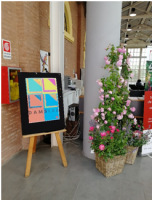
On 28 September, in the central hall of the DAMSLab hosted ArchInProcess, an exhibition curated by students of the Department of the Arts, Master of Science in Visual Arts from the University of Bologna. The exhibition was born from the Laboratory "The Image Factory" coordinated by Anna Rosellini (Associate Professor, University of Bologna) in collaboration with Stefano Setti (PhD student, Catholic University of the Sacred Heart) and Edoardo Traversa (Tutor, University of Bologna).
The exhibition is the result of the collective work of several research groups who explored possible variations of poetics in the vast panorama of contemporary architecture. The ten months of elaboration of the project, starting from a first laboratory phase followed by a long work of critical remediation of the themes investigated, finally culminate in the ideation of the installations present 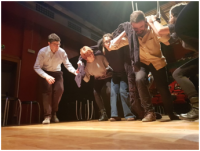
During the TNM, the project partners had the opportunity to attend some practical examples of how culture can regenerate a territory thanks to participation in the cultural laboratory; they were also invited at the theatrical performance "Il Negro del Narciso" organized by Cantieri Meticci on 11 December. It was a unique opportunity to touch live the daily work done on the territory for the integration of different cultures and citizens.
The future
During 2020, efforts will be made to refine the understanding between stakeholders capable of co-organizing events that can attract a wider range of citizens, not only from the city center. The coordination carried out at ULG level for the conception, planning and implementation of events as well as the establishment of procedures for joint and integrated communication will be crucial. The transfer of some good practices from the project partners will also be important for the greater involvement of citizenship.
